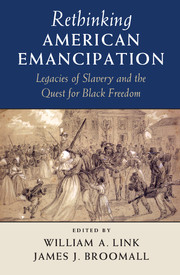Book contents
- Frontmatter
- Contents
- List of figures
- Notes on the Editors and Contributors
- Acknowledgments
- Introduction
- I CLAIMING EMANCIPATION
- 1 Bodies in Motion and the Making of Emancipation
- 2 Force, Freedom, and the Making of Emancipation
- 3 Military Interference in Elections as an Influence on Abolition
- II CONTESTING EMANCIPATION
- III REMEMBERING EMANCIPATION
- Index
3 - Military Interference in Elections as an Influence on Abolition
from I - CLAIMING EMANCIPATION
Published online by Cambridge University Press: 05 November 2015
- Frontmatter
- Contents
- List of figures
- Notes on the Editors and Contributors
- Acknowledgments
- Introduction
- I CLAIMING EMANCIPATION
- 1 Bodies in Motion and the Making of Emancipation
- 2 Force, Freedom, and the Making of Emancipation
- 3 Military Interference in Elections as an Influence on Abolition
- II CONTESTING EMANCIPATION
- III REMEMBERING EMANCIPATION
- Index
Summary
The abolition of slavery required more than a presidential proclamation; it also involved a tough legislative battle – one that benefited from having sympathetic lawmakers come to Washington because of elections that Union soldiers screened. Consequently, there is an additional story of emancipation that remains under-appreciated – how the political process unfolded during wartime through questionable military intervention that contributed to the Thirteenth Amendment. Viewing the coercive measures that aided emancipation underscores, like the other essays in this volume, that the process was contested and dynamic. And, as Gregory P. Downs affirms in Chapter 2, the arms of a powerful state added muscle to the freedom struggle. Military officers on the ground, both during and after the war, could set the tone and tempo for freedom's coming. But while his story includes the interaction of freedpeople with soldiers, this one demonstrates how officials in Washington supported the deployment of the military in a way that ostensibly contradicted the principles of a democracy. These were actions taken against supposedly loyal people, not a defeated enemy. The Thirteenth Amendment owes part of its birth to hard-nosed tactics that included soldiers screening elections, which the practitioners at the time rationalized as preventing domestic traitors from disturbing free elections.
Abraham Lincoln allowed soldiers to prevent traitors from exercising the franchise – a fact that has not escaped historians. In the 1920s, E. Merton Coulter's work on Kentucky noticed the military's interference in elections in the border states and decried the practice. Without necessarily referring to troops stationed at the ballot box, more recent historians have shown the president as embracing a tough brand of politics, but doing so selectively in order to achieve high ideals. In this view he was a nationalist, conscious of reining in executive powers at the proper time. However, the military's role in emancipation remains present primarily in state studies or discrete monographs: general histories and biographical treatments of Lincoln in particular have overlooked the fact that, under the chief executive's watch, the military's interference in elections allowed for pro-administration men to gain public office in time to further the cause of emancipation.
- Type
- Chapter
- Information
- Rethinking American EmancipationLegacies of Slavery and the Quest for Black Freedom, pp. 69 - 90Publisher: Cambridge University PressPrint publication year: 2015

